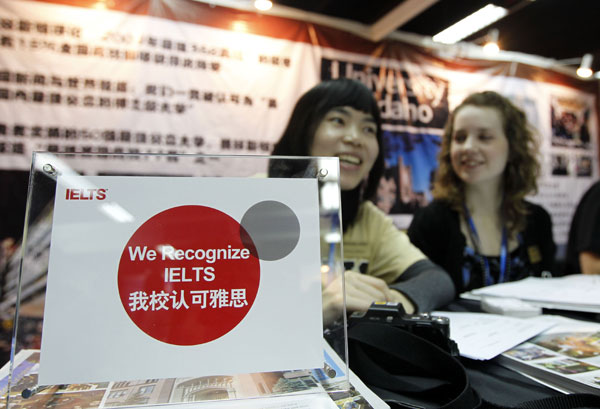Jobseekers keen on brushing up English
Updated: 2011-12-28 08:24
By Chen Jia and Li Yao (China Daily)
|
|||||||||
|
College representatives at an exhibition booth during the Beijing International Education Fair in March. Da Wei / for China Daily |
BEIJING - Luo Yi, a 28-year-old Beijinger, has just cleared one of the major hurdles for his planned career move next year - the International English Language Testing System (IELTS).
"It is not for overseas study or an immigration application. I need it to bargain for better pay," he said.
"A good proficiency in English is necessary if you want to be promoted to a management post in most companies in China," he added.
Besides those who want to go abroad for further study, Luo is among the increasing number of Chinese who are taking the test to improve their English skills in the hope that it will help them succeed in job interviews.
"We used to focus on people planning to study overseas, but market research found that professionals hoping to improve their office English are also our potential clients," said Mou Mingming, the public relations manager at EF China, a private company that specializes in language training, educational tours and cultural exchanges.
"Originally, IELTS was very much focused on people going overseas to study, but we have noticed more people use IELTS for other reasons now," James Shipton, director of exam services at the British Council in China, told China Daily.
"Many employees have found IELTS are useful way to measure or motivate their staff, because IELTS is a communication test," he said.
Li Jifei, a human resources manager at the Beijing office of Morning Bridge Training Co, a travel agency headquartered in Los Angeles that arranges business trips for Chinese to the United States, said it was a plus for job hunters to have good IELTS or TOEFL (Test of English as a Foreign Language) scores.
"It convinces us the applicant speaks fluent English and has no trouble communicating with native English speakers," she said.
"High scores in other tests run in China suggest good performance in writing and coping with exams, but tell us little about the candidate's oral English and communication skills," she added.
"IELTS has seen rapid development in China and 2 million Chinese people have taken part in the IELTS during the past 22 years," said Shipton.
There are other similar English-language tests such as TOEFL and TOEIC (Test of English for International Communication), which also attract a large number of candidates.
However, Shipton cautioned that some English training schools just prepare people for the test and do not really try to help people learn English.












